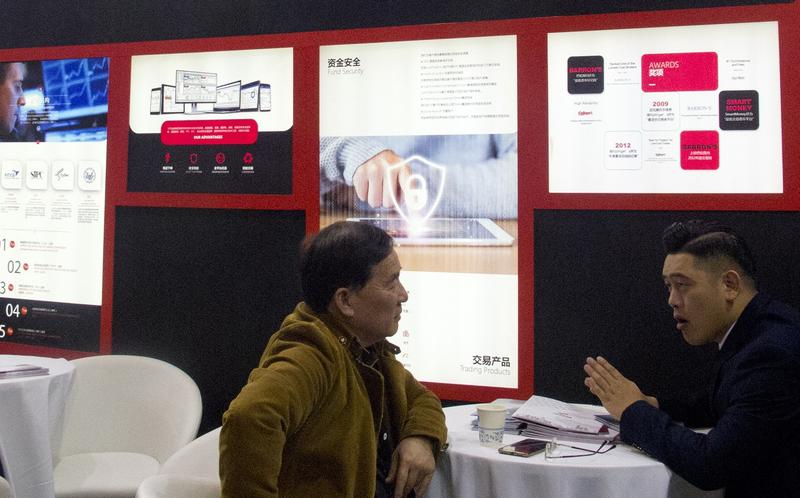Value of funds raised by domestic firms can reach a maximum of 260b yuan
 A visitor (left) makes some inquiries about wealth management products from banks at an exhibition in Shanghai. (PHOTO PROVIDED TO CHINA DAILY)
A visitor (left) makes some inquiries about wealth management products from banks at an exhibition in Shanghai. (PHOTO PROVIDED TO CHINA DAILY)
More commercial banks will offer pilot wealth management products for retirement planning in more cities, as China encourages wealth management companies to play a greater role in the pension system and become part of the main force that stabilizes capital markets.
The China Banking and Insurance Regulatory Commission recently announced the pilot program of WMPs for retirement planning was expanded to 10 cities from March 1. The cities include Beijing, Shanghai and Guangzhou, Guangdong province. Four cities were announced by the regulator last year.
China’s wealth management market for retirement planning has begun to take shape.
Du Yang, researcher with the BOC Research Institute
At the same time, it allowed the wealth management subsidiaries of six more banks, including Bank of China Ltd, Agricultural Bank of China Ltd and Bank of Communications Co Ltd, to participate in the program.
For the four other banks whose wealth management units have already joined the program, the regulator increased the upper limit of total funds raised by each of them from 10 billion yuan ($1.57 billion) to 50 billion yuan. The value of total funds raised by all the domestic institutional participants can reach a maximum of 260 billion yuan, up from 40 billion yuan.
By noon on Monday, the first four wealth management companies taking part in the program had offered 12 WMPs for retirement planning, said chinawealth.com.cn, a WMP information website.
CMB Wealth Management Co Ltd, a subsidiary of the Shenzhen, Guangdong province-based China Merchants Bank Co Ltd and one of the first participants in the program, began to sell a new WMP for retirement planning in the 10 cities on Wednesday.
The product has a duration of five years and requires a minimum investment of 1 yuan. No less than 80 percent of the funds raised for the product will be invested in fixed income assets, while the rest will be invested in equity assets and derivative financial instruments.
CMB Wealth Management set the annualized target return on investment of the product at 5.8 percent to 8 percent based on the WMP manager's past investment experience and market volatility forecast. Everbright Wealth Management Co Ltd, a subsidiary of Beijing-based China Everbright Bank Co Ltd, also started selling its fourth WMP for retirement planning in the 10 cities simultaneously on March 9.
To better protect the interests of investors, the company will draw risk reserves from the product management fee income, with the proportion of the drawn risk reserves being 20 percent of the income. In addition, it will establish a return smoothing mechanism.
The annualized target return on investment of the WMP is set at 5.8 percent to 8 percent. If the product achieves an ROI higher than 5.8 percent on any day, Everbright Wealth Management will channel 50 percent of the excess income into a fund and use it to smooth investment returns when the product matures or when the product is terminated prior to the maturity date.
The CBIRC will guide financial institutions, including trust companies, wealth management companies and insurers, to establish a concept of long-term investing, according to a meeting held by the regulator on Wednesday.
Everbright Wealth Management said it will help investors share China's economic achievements through adoption of medium- and long-term investing strategies. The company added that long-term investing will enable WMP managers to better ensure stability and consistency of investment strategies with the aim of earning higher returns.
"China's wealth management market for retirement planning has begun to take shape," said Du Yang, a researcher with the BOC Research Institute. "Supply of pilot WMPs for retirement planning has diversified, thus laying a solid foundation for the further promotion of such products."
The wealth management subsidiaries of banks participating in the pilot program should build a product system that stresses long-term returns and risk considerations. They should also moderately improve the level of ROI of medium- and long-term asset management products while keeping risks under control, Du said.
jiangxueqing@chinadaily.com.cn


